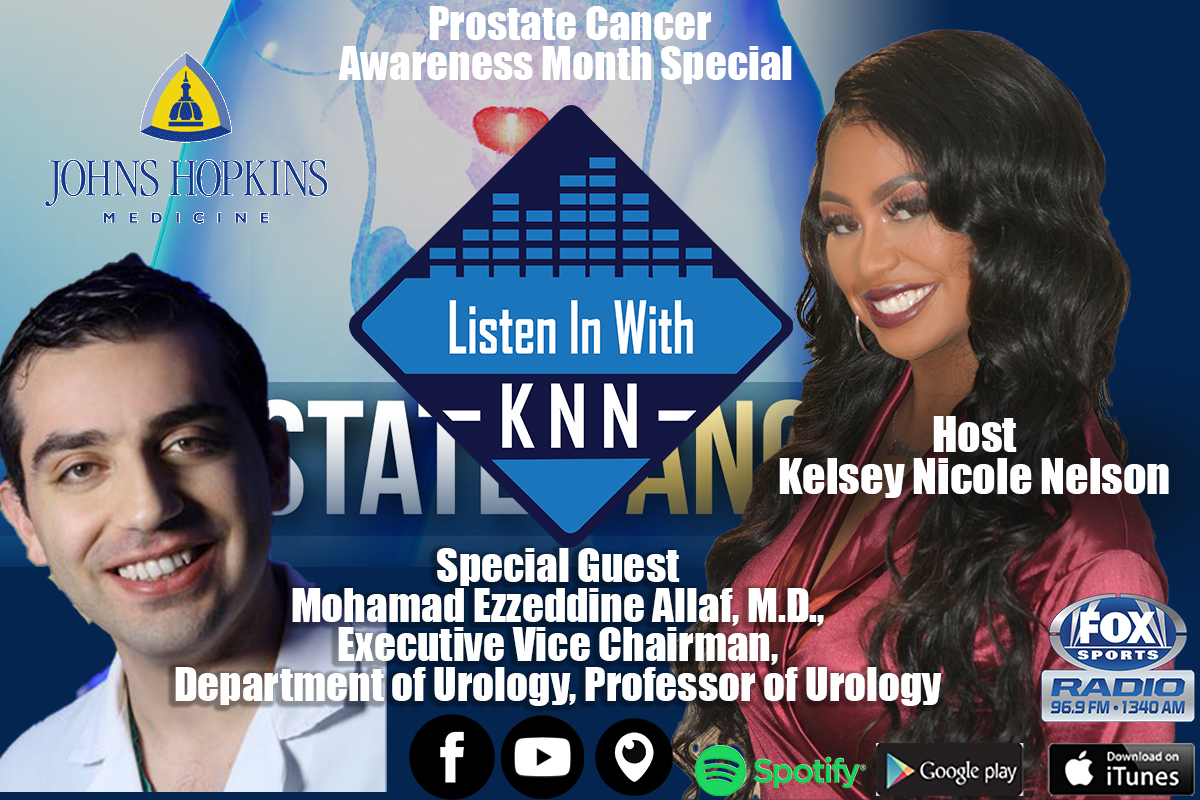On the latest episode of Listen In With KNN on Fox Sports 1340AM, host Kelsey Nicole Nelson welcomed Dr. Mohamad Allaf, who is the Executive Vice Chairman of the Department of Urology and Professor of Urology at the Johns Hopkins University School of Medicine to the show.
September is Prostate Cancer Awareness month and prostate cancer is the most common cancer diagnosed in men. Men who have a family history are at a higher risk of getting prostate cancer. African American men are also at an increased risk of developing prostate cancer in contrast to Caucasian men. When it comes to African American men, it’s usually diagnosed a little further along and is more aggressive. When someone develops cancer it is a harrowing process to go through, that is why it is important for people to get checked out as soon as possible. As time progresses families can feel a lot of worry about how to proceed, that is why planning and preparation can offer some respite, such as looking into medical home help, inexpensive funeral insurance, etc. just so people are prepared as best they can. It is not something that people want to think about but it can be helpful down the line.
There’s a blood test that screens for prostate cancer called the Prostate-Specific Antigen (PSA) Test. About one in four men with an elevated PSA have prostate cancer. These tests are necessary for men to have this checked on. Using specialized equipment to examine the results will help doctors determine at what level it is and what treatment will need to be administered. Laboratories will need to make sure that they have updated equipment, with senior medical advisors telling them that “you may need to use this equipment for better results” as they want to assure patients that nothing is overlooked.
“When there is cancer in the prostate, it makes the PSA and the architecture of the prostate gets disrupted and that PSA is spilled into the bloodstream and is picked up as a red flag for something going on in the prostate. They also could have an enlargement that can do the same thing spilling some PSA and inflammation,” Dr. Allaf said.
Before getting screened, men ages 55 to 69 should have a discussion with their doctor.
“If it’s abnormal, it doesn’t necessarily mean you have prostate cancer. If prostate cancer is diagnosed early, it is virtually curable in most circumstances. When it’s picked up late, we get into trouble,” he said. “It is very important to have those discussions with your physicians and to get checked because it’s a simple blood test.”
Luckily, there are alternatives to prostate cancer screening like MRI’s and biopsies. Most cancers detected today are without symptoms. Men with more advanced prostate cancers can experience symptoms including a weak urine stream, pain during urination and ejaculation, blood in the semen and bone pain.
“Those would be symptoms that are potentially prostate cancer but I would also tell the audience that they’re very non-specific and there are so many other things that can cause the same exact symptoms. It’s not uncommon for men to come to us complaining that their stream is weak at 60 years old thinking they have prostate cancer. The most common is going to be an enlargement of the prostate,” Dr. Allaf said. “If you’re bothered by them, at least get them checked out to make sure that is not prostate cancer.”
If the cancer is detected early and the cancer is not aggressive, surgery might not be necessary. The cancer is managed through a process called active surveillance where it is monitored through MRI every year and repeated the biopsy every two years.
“Additionally, there’s the external beam, seeds, multi-weak treatments, condensed five day treatments. Depending on the size of your prostate and symptoms, we would pick the best option if that’s where we want to go. Surgery remains a very good definitive gold standard way of doing it and we do surgery using a robotic tool called robotic prostatectomy,” he said.
Dr. Allaf strongly believes in going to a urologist who will be open to communicate with their patients.
“Sometimes as men, we put our heads in the sand and would rather not know because you’ve heard all these stories. Empower yourself with information and knowledge, see a good urologist or physician who will counsel you well and take into account your family and kids. I know they want you to be in the best of health and live as long as possible.”
